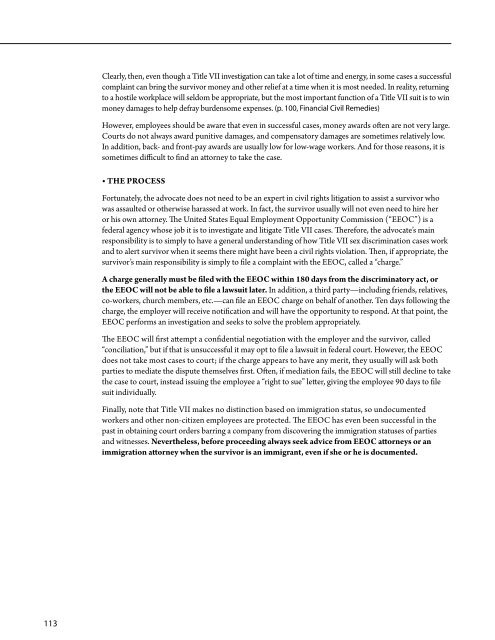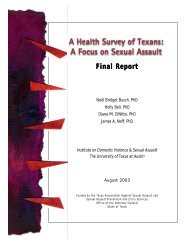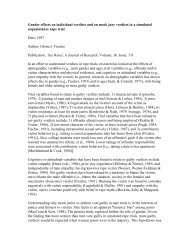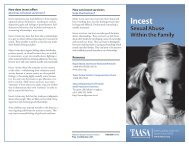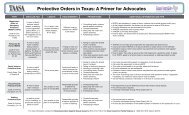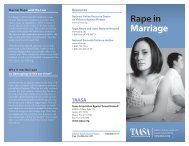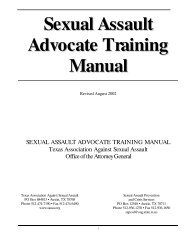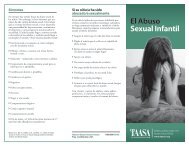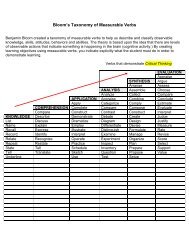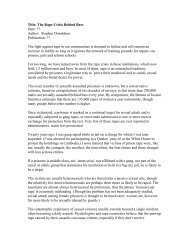Sexual aSSault LEGAL ADVOCACY MANUAL - Texas Association ...
Sexual aSSault LEGAL ADVOCACY MANUAL - Texas Association ...
Sexual aSSault LEGAL ADVOCACY MANUAL - Texas Association ...
You also want an ePaper? Increase the reach of your titles
YUMPU automatically turns print PDFs into web optimized ePapers that Google loves.
Clearly, then, even though a Title VII investigation can take a lot of time and energy, in some cases a successful<br />
complaint can bring the survivor money and other relief at a time when it is most needed. In reality, returning<br />
to a hostile workplace will seldom be appropriate, but the most important function of a Title VII suit is to win<br />
money damages to help defray burdensome expenses. (p. 100, Financial Civil Remedies)<br />
However, employees should be aware that even in successful cases, money awards often are not very large.<br />
Courts do not always award punitive damages, and compensatory damages are sometimes relatively low.<br />
In addition, back- and front-pay awards are usually low for low-wage workers. And for those reasons, it is<br />
sometimes difficult to find an attorney to take the case.<br />
• The Process<br />
Fortunately, the advocate does not need to be an expert in civil rights litigation to assist a survivor who<br />
was assaulted or otherwise harassed at work. In fact, the survivor usually will not even need to hire her<br />
or his own attorney. The United States Equal Employment Opportunity Commission (“EEOC”) is a<br />
federal agency whose job it is to investigate and litigate Title VII cases. Therefore, the advocate’s main<br />
responsibility is to simply to have a general understanding of how Title VII sex discrimination cases work<br />
and to alert survivor when it seems there might have been a civil rights violation. Then, if appropriate, the<br />
survivor’s main responsibility is simply to file a complaint with the EEOC, called a “charge.”<br />
A charge generally must be filed with the EEOC within 180 days from the discriminatory act, or<br />
the EEOC will not be able to file a lawsuit later. In addition, a third party—including friends, relatives,<br />
co-workers, church members, etc.—can file an EEOC charge on behalf of another. Ten days following the<br />
charge, the employer will receive notification and will have the opportunity to respond. At that point, the<br />
EEOC performs an investigation and seeks to solve the problem appropriately.<br />
The EEOC will first attempt a confidential negotiation with the employer and the survivor, called<br />
“conciliation,” but if that is unsuccessful it may opt to file a lawsuit in federal court. However, the EEOC<br />
does not take most cases to court; if the charge appears to have any merit, they usually will ask both<br />
parties to mediate the dispute themselves first. Often, if mediation fails, the EEOC will still decline to take<br />
the case to court, instead issuing the employee a “right to sue” letter, giving the employee 90 days to file<br />
suit individually.<br />
Finally, note that Title VII makes no distinction based on immigration status, so undocumented<br />
workers and other non-citizen employees are protected. The EEOC has even been successful in the<br />
past in obtaining court orders barring a company from discovering the immigration statuses of parties<br />
and witnesses. Nevertheless, before proceeding always seek advice from EEOC attorneys or an<br />
immigration attorney when the survivor is an immigrant, even if she or he is documented.<br />
113


